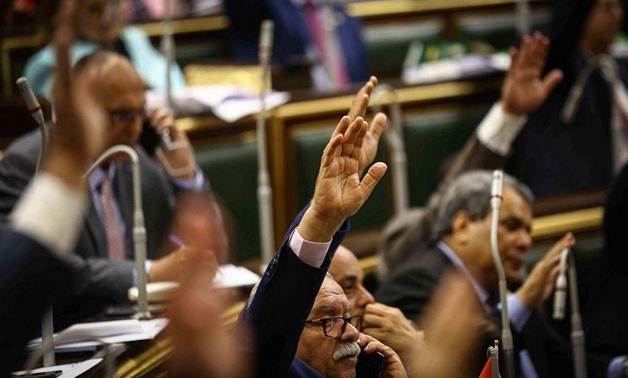CAIRO – 24 July 2019: The Egyptian Parliament has voted in favor of approving a new NGO law, which was revised by the State Council in legislative and constitutional terms.
The new NGOs law holds several privileges, including allowing NGOs to receive foreign funding and establish new associations through a notifications system.
Previously, criticism was directed towards NGOs law in Egypt, especially with listing imprisonment as a punishment in the law; the new law, however, has scrapped prison sentences imposed on violators of the law.
Egypt Today held several interviews with a number of experts, including Hafez Abu Saada and Hazem Mounir, to come up with the following pros to the new law:
The new law privileges include:
- The law came as a result of a 6-year discussions and community dialogue, which included topics on associations, unions, and the Ministry of Solidarity and Civil Society.
- The new law abolishes imprisonment as a punishment.
- Canceling the supervising over foreign organizations operating in Egypt.
- Allowing NGOs to receive foreign funding, on condition of informing the administrative authorities (as a routine procedure).
- Easing the restrictions that were imposed in previous laws in order to establish new associations.
- Establishment of NGOs only by “notifying”.
- It would also allow up to 25% of organizations’ board of directors to be foreign residents, up from 10% under the old law.
- Foreign communities in Egypt are now allowed to establish their own association, according to the law.
- The law allows associations to establish companies and investment funds.
- Foreign funding of NGOs has been codified into the law with a specific and clear mechanism.
- Facilitating the work of foreign organizations in Egypt.
- The law has approved many benefits and exemptions for NGOs.
- Authorized the right to join foreign organizations and NGOs.
- Allowed the NGOs to open new branches outside Egypt according to specific regulations.
- The law sat a clear mechanism for establishing shelters for children and the elderly, (due to the significance of this matter).
- Facilitating the associations' access to funding within 60 days. The non-response during this period according to the new law is considered as approval, while previously, the non-response within 70 days was usually considered as rejection.
- Prohibition of the combination of the membership of the Board of Directors and working in the NGO administrative body, (to control corruption).
- Creating new chapter in the law to be organizing for the volunteering activity in addition to ensuring the protection of volunteers and beneficiaries.
Earlier on July 14, Egypt's House of Representatives headed by Ali Abdel Aal approved a 107-article draft law on NGOs, and referred it to the State Council for revision.

The legislative department revised the bill as part of the measures taken before it is passed into law. The draft law cancels the controversial law issued on NGOs in 2017.
The bill includes nine issuance articles, including an article preventing NGOs placed on terrorist lists to legalize its presence.
All NGOs, including regional and foreign organizations, have to operate while committing to their basic regulations, activities and funding, in a way that respects the provisions and principles of the Egyptian Constitution and laws and international conventions ratified by Egypt, according to the law.
All non-governmental organizations and associations, and regional and foreign non-governmental unions, organizations and entities exercising civil work in light of the law shall adjust their conditions in accordance with its provisions within a year since the date of implementing the executive regulations of the law; otherwise, the specialized court will dissolve them.
In order for any of the NGOs to legalize its presence, it has to notify the competent ministry of all the data of the organization or entity, and define its activities, sources of funding, programs, protocols and memoranda of understanding. It also has to amend its regulations to ensure compliance with the provisions of this law.
In case they are dissolved, their funds would be transferred to the national fund tasked with supporting the projects of civil institutions and associations. Also, the activities of the dissolved entities would be stopped by the power of law.
In all cases, civil institutions and entities included on the lists of terrorist entities or those that participated in terrorist crimes cannot legalize their presence in case final rulings against them were issued, according to the law.
The draft law stipulates that the prime minister shall issue the executive regulations of the annexed law within six months from the date of its publication. Until such regulations are issued, the executive regulations and the existing resolutions shall continue to be implemented in a manner that is consistent with the provisions of this law and the annexed law.
This law shall be published in the Official Gazette and shall come into force on the day following the date of its publication.
In June 2017, Egypt's President Abdel Fatah al-Sisi signed law no. 70/2017 on NGOs and their operation in Egypt, as an annulment to the previous law no. 84/2002, after being passed by two-thirds of the Parliament in November 2016.
However, in November 2018, Sisi agreed to form an official committee to discuss the law issued in the previous year.
During his participation at the second edition of the World Youth Forum, the Egyptian leader said the law might be amended after several studies and discussions took place regarding its articles.


Comments
Leave a Comment